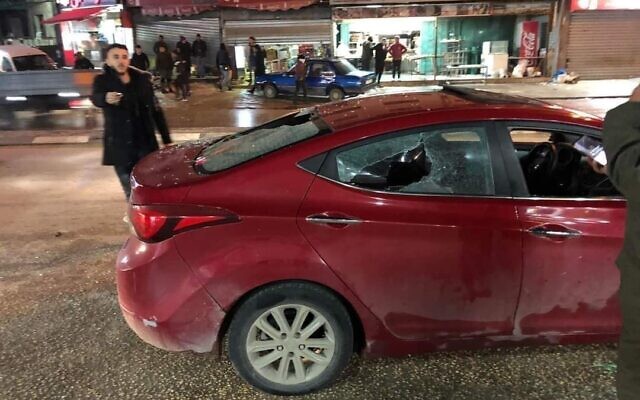Jewish extremists hurled stones at Palestinians while parading through a West Bank town near Nablus on Monday night, injuring three people and smashing cars throughout the village, Palestinian officials and Israeli rights groups said.
A convoy of settlers drove through Hawara, honking their horns and blasting music to celebrate the release of an Israeli imprisoned last year for throwing stones at Palestinians, according to an Israeli security official. The extremists later began throwing stones at local Palestinians.
“The friction began when a number of cars driving on Road 60 through Hawara, threw stones at businesses and parked cars and caused much damage,” the Israeli military said in a statement.
At least 20 Palestinian cars were damaged and storefronts smashed in the village, the left-wing Yesh Din rights group said. An Israeli police spokesperson said officers were investigating the incident.
Local Palestinian Authority official Ghassan Daghlas said in a phone call that a 15-year-old Palestinian from Hawara was rushed to a Nablus hospital after being struck in the head by a stone thrown by a Jewish Israeli.
According to Hawara town mayor Mueen Dameidi, another two Palestinians, respectively aged 12 and 17, were also lightly wounded by the extremists’ stone-throwing.
Palestinian officials claimed that Israeli soldiers were present at the scene, but did nothing to prevent the attacks. When Palestinians threw back stones at their assailants, soldiers fired tear gas and stun grenades to disperse them, Dameidi said.
“The settlers broke cars. They smashed storefronts and shouted and cursed at the village residents — all in the presence of the army,” Dameidi said.

A Palestinian points at a car whose windows were allegedly smashed in by a stone-throwing Jewish extremists on January 24, 2022. (courtesy)
The Israeli army declined to comment on Dameidi’s claim.
Hawara mostly lies in the West Bank’s Area C, where Israel maintains full military and civilian control. An Israeli checkpoint at the northern end of the village has frequently seen clashes between Palestinians and soldiers.
To the northeast lies Yitzhar, widely seen as one of the West Bank’s most hardline Israeli settlements. The Jewish Israeli former prisoner was reportedly being taken back to his home in the town following his release.
Israeli security officials have warned that violence by Jewish extremists in the West Bank has spiked in recent months. Shin Bet officials told The Times of Israel in late December that Jewish extremist violence had increased by 50 percent over the past year.
Following Monday night’s attack, Defense Minister Benny Gantz pledged more action on “nationalist crime.” As in previous statements, Gantz avoided specifying exactly who was carrying out the attacks.
“The recent incidents of nationalist crime in Judea and Samaria are grave and we will deal with them severely. Anyone who throws stones, sets vehicles ablaze… is a terrorist,” Gantz tweeted.
Nonetheless, the internal Israeli political debate over the phenomenon has been divisive. Right-wing Israeli politicians have denounced the characterization of the attacks as “settler violence,” charging that it is an attempt to besmirch all Jews living in the West Bank.
“There are marginal elements in every community and they should be dealt with using all means, but we must not generalize about an entire community,” Prime Minister Naftali Bennett said in mid-December.
Documentation of the caravan and the demonstration of Jewish power in Huwara pic.twitter.com/z5zs67h8p8
– Shahar Glick (@glick_sh) January 24, 2022
Much of the violence is allegedly perpetrated by Jewish extremists who live in illegal outposts. Last Friday, masked figures descended from the Givat Ronen outpost — one of several outposts near Yitzhar — and viciously beat left-wing Israeli activists in the nearby Palestinian town of Burin, wounding at least six.
“I want to ask a question: if Palestinians attacked Israelis, with the Israeli army right there — would they just allow it to happen? Of course not,” said Hawara town mayor Dameidi.